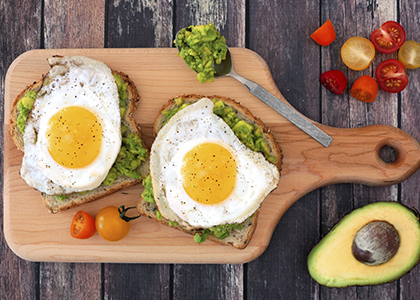
The Truth About Cholesterol
By Isabel Smith, MS, RD, CDN
Cholesterol is such a hot topic, and has been for some time. ‘Should we’ or ‘shouldn’t we’ eat it is usually the question when it comes to the food we’re eating, and ‘how much’. Due to the thinking that cholesterol in food may seriously affect blood cholesterol levels, there has been a restriction for some time on how much should come from food – around 300 mg daily. However, due to more recent research and finding that most of the cholesterol in our blood (85%) comes from our bodies and isn’t as much influenced by the food we eat (only about 15%), new dietary guidelines released in 2015 have actually removed the cholesterol cap from our food.
So, in short, most of what you had once heard about how dietary cholesterol is bad for blood cholesterol, has been reconsidered.
So, what’s the deal with cholesterol and what does it do?
We’ve been trained to believe that consuming cholesterol causes heart health problems but it’s actually quite important for health, and your body does require it for healthy function. Cholesterol plays a key role in the production of sex hormones, brain health and memory, immune function, libido and more. In short, it’s really important.
So now that I’ve told you that you do need some cholesterol, should you run out and start eating bacon and eggs, etc? Not so fast.
Remember that it’s true that everything we eat should be consumed in moderation, no matter what it is; too many carrots and you’ll turn orange. So, instead of going out on a bender, try including healthful sources of cholesterol like eggs and grass-fed red meat on occasion (more about these two below!). But, as I mentioned before, they should be consumed in moderation instead of in excess.
Eggs and Meat Debunked:
Eggs: For most people, 4-5 egg yolks can safely be consumed on a weekly basis; and although yes there is some cholesterol in there, there’s also some seriously healthy nutrients including Lutein – which helps to prevent and slow age-related macular degeneration. Eggs are also a healthy and easy option for protein and can be consumed at breakfast, lunch and dinner.
Red Meat: Red meat is also a big question mark for most people. Again, like the eggs, most people can safely consume red meat, especially if it’s a leaner cut (like filet mignon, bison, or grass-fed options) once every week to ten days. Red meat is a good source of iron and protein for many so like the eggs, in moderation it can safely be consumed.
It’s important to note that with meat and animal-based products, you should aim to choose organic/grass-fed/wild whenever possible so to avoid added hormones, nitrates, preservatives and more.
Along with eating foods that are higher in cholesterol in moderation, (just because it’s a good idea to do so), there also a few things — food and non-food — that you can do that may help to promote healthy cholesterol. Here’s my short list:
- Exercise: The more you do, the better when it comes to lowering cholesterol
- Eat more fat: Healthy fat like olive oil, avocado and nuts may also help to alter cholesterol levels in favor of more “good” cholesterol (or HDL)
- Include fiber: Fiber, particularly soluble fiber like that found in chia seeds and oats (and juices too!), may help to lower cholesterol
- Load up on veggies: Veggies are loaded with fiber that may help to lower cholesterol naturally
8 Tips to Help You Naturally Lower Cholesterol
Health Condition: High Cholesterol